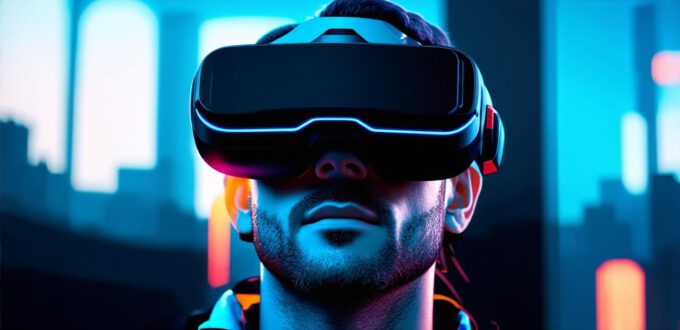<!DOCTYPE html>
Pros of Virtual Reality Development:
VR technology offers a unique opportunity for app developers to create immersive user experiences that can capture the imagination and engage users on a deeper level. By placing users directly into a virtual environment, apps can offer a more realistic and interactive experience that can be difficult to achieve through traditional 2D interfaces.
Enhanced User Experience
For example, a real estate app that uses VR technology allows users to explore properties in a fully immersive way, giving them a better sense of the space and its features.
Increased Engagement
Studies have shown that VR experiences can be highly engaging, with users spending more time in virtual environments than they would in traditional interfaces. This increased engagement can lead to higher user retention rates and a greater likelihood of repeat use.
For example, a fitness app that uses VR technology can create a more dynamic and exciting workout experience, leading to more motivated and engaged users.
Differentiation from Competitors
By incorporating VR technology into their apps, developers can differentiate themselves from their competitors and stand out in crowded app markets. This can be particularly valuable for apps that are looking to capture a niche market or target a specific demographic.
For example, an educational app that uses VR technology to create interactive history lessons can appeal to students who are looking for something more engaging and immersive than traditional textbook-based learning.
Cons of Virtual Reality Development:
One of the biggest challenges facing VR developers is the high cost of developing and implementing this technology. The hardware required to create VR experiences can be expensive, and developing for multiple platforms (such as Oculus, HTC, and PlayStation) can further increase costs.
Additionally, the development process for VR apps requires specialized skills and expertise, making it more difficult to find and hire qualified developers.
For example, a gaming app that uses VR technology may require specialized game engines and programming languages, making it more challenging to develop and maintain than a traditional 2D game.
Limited Market
While the potential for increased engagement and differentiation is significant, the market for VR apps is still relatively small compared to traditional mobile apps. This means that there may be limited revenue opportunities for app developers who choose to invest in VR technology.
For example, a travel app that uses VR technology to create virtual tours of popular destinations may have a smaller user base than a traditional photo-sharing app.
Limited Accessibility
Not all users have access to the hardware required to experience VR, which can limit the potential reach of VR apps. For example, not everyone has a high-end computer or gaming console with VR capabilities, which means that some users may be unable to access VR experiences.
Additionally, there may be physical limitations for users who are unable to use VR due to health conditions or disabilities.
Real-Life Examples of Virtual Reality Development:
The Real Estate App
A real estate app that uses VR technology allows users to explore properties in a fully immersive way, giving them a better sense of the space and its features. For example, a user could virtually walk through a property and see the layout of the rooms, the size of the windows, and the style of the furniture.
The Fitness App
A fitness app that uses VR technology can create a more dynamic and exciting workout experience, leading to more motivated and engaged users. For example, a user could virtually ride a bike through a virtual cityscape or take a yoga class in a virtual park.
The Educational App
An educational app that uses VR technology can create interactive history lessons that allow students to explore historical events in a more immersive way. For example, a user could virtually walk through ancient Rome or witness the signing of the Declaration of Independence.
Expert Opinions:
“Virtual reality is still in its early stages, but it has the potential to revolutionize how we experience digital content.” – Shervin Pishevar, venture capitalist and tech entrepreneur
“Virtual reality can create a level of engagement that traditional interfaces cannot match, making it a valuable tool for app developers looking to differentiate themselves from their competitors.” – Michael Abrash, virtual reality pioneer and author of “Humanizing Computers”
Summary:
Virtual reality technology offers both opportunities and challenges for app developers. While VR can enhance user experiences, increase engagement, and differentiate apps from their competitors, it also requires significant investment, has limited market potential, and may not be accessible to all users. Ultimately, whether or not virtual reality development is a worthwhile investment will depend on the specific goals and resources of each app developer. By carefully weighing the pros and cons of VR development and considering real-life examples, app developers can make an informed decision about whether this technology is right for their needs.
FAQs:
What are some common challenges facing virtual reality developers?
High costs of developing and implementing VR technology, limited market potential for VR apps, and limited accessibility to users who do not have the hardware required to experience VR.
How can virtual reality enhance user experiences?
Virtual reality offers a unique opportunity for app developers to create immersive user experiences that can capture the imagination and engage users on a deeper level. It allows users to be placed directly into a virtual environment, offering a more realistic and interactive experience than traditional 2D interfaces.
What is the potential revenue opportunity for virtual reality apps?
While there may be limited revenue opportunities compared to traditional mobile apps, the potential for increased engagement and differentiation can make VR development worthwhile for some app developers.
